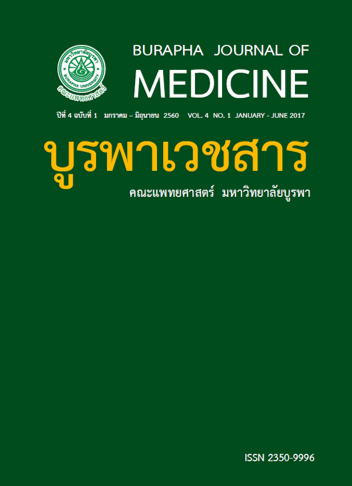Role of family physician and happiness in primary care of southern area
Keywords:
Family physician, Primary care, Role, HappinessAbstract
Introduction The major role of family physician is serving primary care for individuals, families
and communities. Recently, there is an increase in training number of family physicians. However,
lacking of evidence based to evaluate the roles of family physicians in actual primary care
practices.
Objectives To study the actual roles of family physicians in 7 dimensions of primary care service
and to compare the roles in different types of care.
Methods An analytical cross sectional study was conducted in family physicians who have
been certified for diploma in Thai Board of Family Medicine since 2002-2015 (Batch 1-14). All
of them must be working in 14 provinces of southern Thailand. Data collected via electronic
mails and using online Google questionnaire which were sent by smart phones. A descriptive
statistic was used and analyzed by the Kruskal Wallis test was analyzed to identify roles among
difference types of service at p value <0.05.
Results The roles in primary care service taken frequently were cultural competent (mean
3.56, S.D. 0.52), coordinated care (mean 3.62, S.D. 0.32), family-centeredness (mean 3.47, S.D.
0.47), continuous care (mean 3.39, S.D. 0.36) and community orientation (mean 3.02, S.D. 0.55).
The roles taken for sometime were comprehensive care and first contact care and (mean 2.98,
S.D. 0.48 and mean 2.76, S.D. 0.49 respectively). By comparing, first contact care significantly
differed in each types of work place (p value 0.029). Supported score was at average medium
level (2.00-2.99). Most of the physicians were happy at high to the highest level.
Conclusion The family physicians regularly took action in all 7 dimensions of primary care
service. First contact care was differed significantly in the work places. Majority of physicians
felt happy while working in primary care as a family physician.
References
http://tcijthai.com/tcijthainews/view.
php?ids=1359 เข้าถึงเมื่อ ธันวาคม 2558
2. พณพัฒน์ โตเจริญวาณิช. หลักการเวชศาสตร์
ครอบครัว: เวชศาสตร์ครอบครัวแนวคิดและ
ประสบการณ์ในบริบทไทย: สหมิตรพริ้นติ้งแอนด์
พับลิชชิ่งจำกัด; 2553. น.24.
3. สตางค์ ศุภผล, จิรฐา บุตรแก้ว, วราวุธ กุลเวช
กิจ. การสำรวจสถาณการณ์การปฏิบัติงานของ
แพทย์ เวชศาสตร์ครอบครัวในระบบบริการสุขภาพ
ไทย. วารสารระบบบริการปฐมภูมิและเวชศาสตร์
ครอบครัว. 2554; 3(1): 12-8.
4. Smith J. Primary care: balancing health needs,
services and technology. International
Journal of Integrated Care. 2001; 1: e36.
5. Diener E, Suh ME, Lucas ER, Smith LH.
Subjective well- being: three decades
of progress. Psychological Bulletin 1999;
125(2): 276-302.



